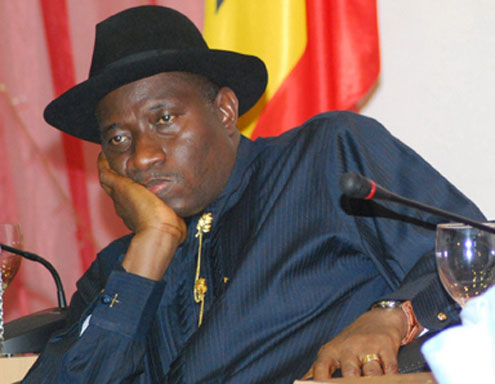
President Goodluck Jonathan
The warning came after the South African government seized US$5.7 million wired by the Nigerian government through a bank to an arms dealer in that country.
South Africa’s Asset Forfeiture Unit of the National Prosecuting Authority said the money, about N952 million, was the proceed of illegal transactions, according to local paper, City Press.
The seizure was the second in nearly three weeks, coming after authorities there froze $9.3 million transported in cash by two Nigerians and an Israeli for arms purchase. At the time, South Africa said the transaction violated its laws on movement of cash.
In a terse reaction to what appears a potential diplomatic spat between the two countries, the Nigerian government denied the second transaction was illegal and reminded South Africa of how Nigeria has provided a beneficial environment for South African companies like MTN, DSTV and a host of others to do business unhindered.
“It is our hope that South Africa would reciprocate this noble gesture,” the National Security Adviser, Sambo Dasuki, said Monday, with a vow to eradicate Boko Haram regardless of the antics of “fifth columnists”.
Mr. Dasuki, named by the South African newspaper as the official who signed off the first controversial deal, confirmed late Monday the second transaction occurred as reported but firmly denied it was conducted illegally.
“We want to state clearly that a business transaction actually took place between a legitimate company in Nigeria and another legitimate one in South Africa through the bank,” said Mr. Dasuki through a spokesperson, Karounwi Adekunle.
“In the course of events, the South African company could not perform and decided to refund the money. What is illegitimate in this transaction done through the bank?” he queried.
Details of the latest transaction came more than two weeks after two Nigerians and an Israeli were arrested as they attempted to smuggle US$9.3 million through Lanseria International Airport, Johannesburg, on September 5 in a private jet from Abuja.
The money, stashed in three suitcases, raised suspicion when the passengers’ luggage were unloaded and put through the scanners.
The National Prosecuting Authority, NPA, in South Africa said there was an invoice for helicopters and armaments intended to be used in Nigeria.
Two black plastic suitcases, filled with 90 blocks each containing US$100,000 in notes, with combination locks, were seized, as well as two pieces of hand luggage also containing US currency, according to City Press.
The Israeli national, Eyal Mesika, had the combination to open the locks.
Under South African laws, a person entering or leaving the country is expected to carry cash not exceeding US$2,300, or the equivalent in foreign currency notes.
The news of the first transaction angered Nigerians, particularly as it became clear the private jet involved belonged to the head of the Christian Association of Nigeria, CAN, Ayo Ortisejafor.
Mr. Oritsejafor, a close ally of President Goodluck Jonathan, said the plane had been leased to a third party and he could not be blamed for its schedules.
The Nigerian government later admitted it was behind the arms deal, claiming it acted out of desperation for arms to defeat extremist sect, Boko Haram.
South African paper, City Press, said it was the NSA, Mr. Dasuki, who personally authorised the first arms contract by issuing an end-user certificate, alongside a “shopping list” for helicopters, unmanned aircraft, rockets and ammunition.
But Nigerian security officials said the report by the newspaper indeed provided proof that the first transaction was not illegitimate as well, since the end-user certificate and a shopping list were provided.
A security source was quoted as saying “in issuing end-user certificate, the ONSA (Office of the National Security Adviser) ensures that it carries all relevant agencies and stakeholders along. Therefore, such a responsibility is not a unilateral development,” according to PRNigeria, an agency frequently used by the Nigerian military to disseminate official statements.
“For security reasons, the chains leading to the issuance of end-user certificate cannot be put in the public domain.
“The recent interest in arms purchase was informed by the challenges of insurgency which our nation had been grappling with in the last few years. This is why the understanding of all Nigerians is necessary.
“Nigeria is desperate to counter activities of terrorists no matter what it takes even when some of our friends are not being fair to us,” the agency said Monday.
The latest transaction was between Cerberus Risk Solutions, an arms broker in Cape Town, and Societe D’Equipments Internationaux, said to be a Nigerian company based in Abuja.
The paper said the deal fell apart after Cerberus, which had earlier received from Nigeria R60 million (N1.02 billion) through its account at Standard Bank, tried to repay the money as it could not resolve its registration formalities with the South African authorities.
“Cerberus was previously registered as a broker with the National Conventional Arms Control Committee (NCACC), but the registration expired in May this year,” City Press said.
“The marketing and contracting permits also expired at the same time. The company has since applied for re-registration, but the application lay in the NCACC’s mailbox for more than two months.
“Sources told Rapport that Cerberus apparently tried to pay the money back to the Nigerian company, after which the bank became suspicious,” the paper reported.
The paper added that while the NPA’s Asset Forfeiture Unit subsequently obtained a court order in the South Gauteng High Court to seize the money, the NPA spokesperson Nathi Mncube, said there were no indications the two transactions were related.
“However, both are now the subject of a criminal investigation and all possible information and connections are being investigated,” Mr. Mncube was quoted as saying.
The statement from Mr. Dasuki’s office confirmed the inability of the South African company to deliver and the attempt to refund
Source Premium Times
No comments:
Post a Comment